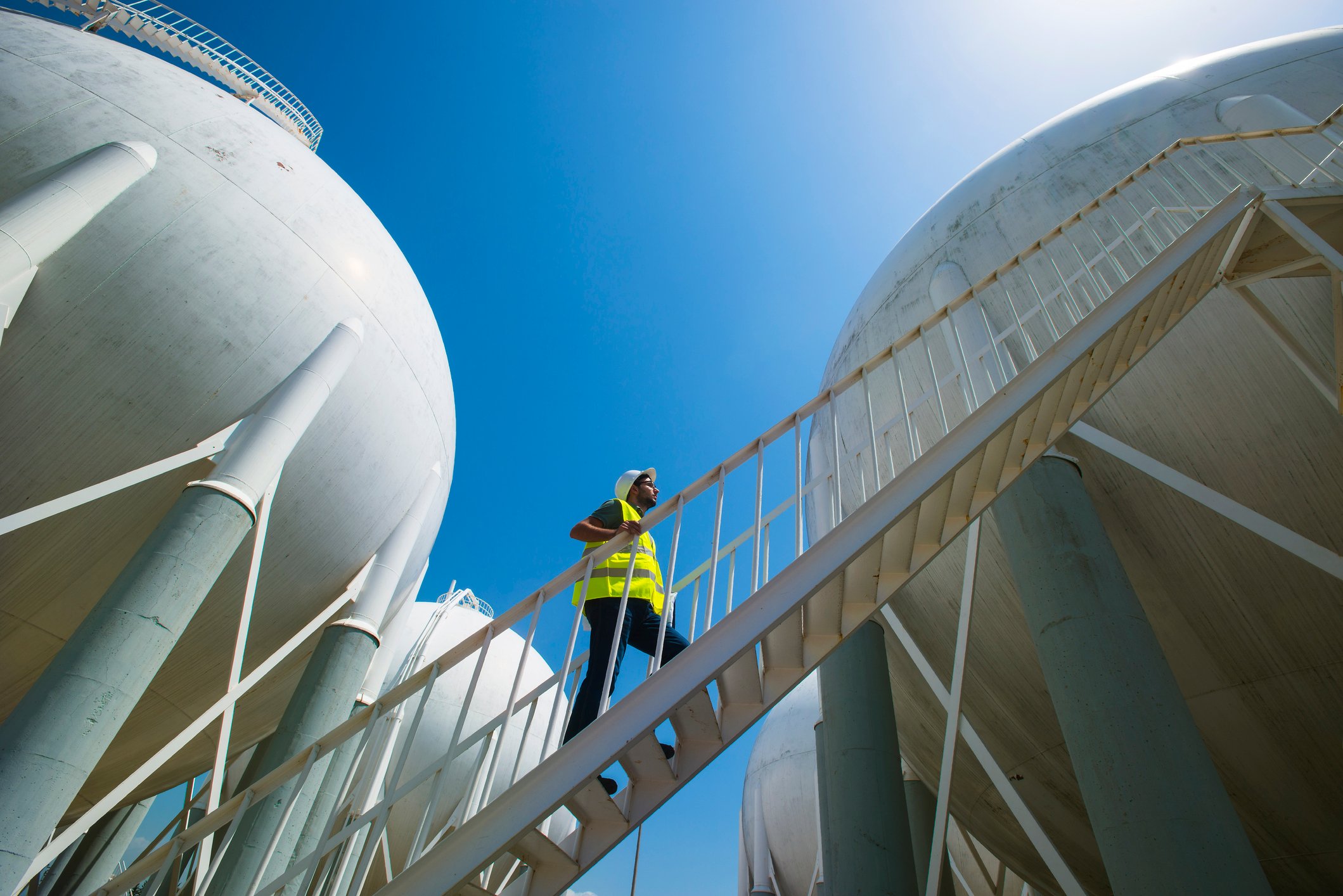What is the role of a chemical operator?
Chemical operators are instrumental in ensuring the efficient and safe production of petroleum products and chemicals used in various oil and gas processes. As experts in operating chemical processing equipment, their primary responsibility is to handle the manufacturing and treatment processes while adhering to strict safety and quality protocols.
Ready to take the next step?
Apply now for a job as a chemical operator
Production Operator
Location: Morrisburg
Branche: Food Production
Expertise: Production & Manufacturing
Experience: 2 years
Responsibilities Operate and monitor food processing equipment such as extraction systems, evaporators, spray dryers, and packaging machinery. Set up, adjust, and troubleshoot machinery and equipment to support efficient production runs. Perform general maintenance and repairs, resolving mechanical issues to minimize downtime. Monitor and control processing conditions (temperatures, pressures, flow rates, etc.) to ensure consistency and product quality. Conduct regular quality checks on raw materials, in-process product, and finished goods to meet specifications. Maintain accurate records of production, maintenance, machine settings, and inventory. Follow strict hygiene, workplace safety, food safety, and environmental protocols. Collaborate with production, maintenance, and quality assurance teams to troubleshoot and improve processes. Support waste management processes and ensure compliance with environmental and food safety standards. Stay updated on industry best practices, regulations, and equipment requirements.
Field Operator
Location: Cold Lake
Branche: Conventional Energy
Expertise: Production & Manufacturing
Experience: 1 years
We have a current opportunity for a Field Operator on a contract basis. The position will be based in Cold Lake. For further information about this position please apply MAIN FUNCTIONS Operate equipment and wells by applying operating and safety procedures and guidelines to meet daily operational plan, reduce equipment failure and efficient resources administration TASKS AND RESPONSIBILITIES* Responsible to implement on daily work objectives, housekeeping, safety, health, environmental and security* Active participation on daily toolbox meetings and regular, reported safety meetings* Identify and implement corrective and optimization actions by the continuous surveillance of wells and equipment to ensure reliable, efficient and safe operational conditions* Function as Equipment Care Technician, and routinely use Maintenance skills in performing simple maintenance activities* Report when the alarm, emergency or emergency shutdown system is out of service* Provide detailed, clear and accurate information when changing shift, to guarantee that unit conditions are updated and ensure operations continuity* Coordinate, control and monitor maintenance jobs according with the corrective, predictive and preventive planning* Report continuously in the log book all relevant operational events and abnormal situations or deviation occurred in the work area, equipment or personnel* Take samples of products for laboratory analysis and execute field laboratory tests* Active participation on emergency response activities* Report incidents internally and escalate awareness as per the Incident Reporting Guidelines* Ensure that Operations Shift Supervisor is informed and consulted about operations activities* Ensure good communication across the work team so that issues / actions can be adequately addressed* Provide the basic facts concerning well producing problems, current production rates, and current condition of the well* Ensure that the well problem diagnostics are thorough and complete before requesting Well Work intervention operations* Ensure that the wellhead and well surface equipment are maintained and are in good working order prior to Wellwork operations taking over responsibility for the well for intervention operations* Provide assistance and support to the ongoing Wellwork operations as needed
Start-Up Specialist III
Location: Spring
Branche: Conventional Energy
Expertise: HR & Recruiting
Experience: 0 years
Job Summary: Subsea Commissioning and Start-Up Advisor as part of integrated Systems Completion and Start-up Team on the Whiptail Project. Primarily responsible for supporting development and execution of the (Company owned) Subsea Commissioning Procedures and Start-Up Work Packs aligned with the (Contractor) Topside FPSO commissioning sequence. Job function and responsibilities: Input to / development of the initial Subsea Commissioning Procedures and Start-Up Plan / Work Packs Support Company Start-Up Leads to ensure planning for start-up is addressed (SURF systems completion plans, start-up workshops, background flare planning); proactively work with Project Team and Contractor to resolve identified issues Assist Company Control Room Operator (CRO) Advisors in training and knowledge transfer to Contract operators for Subsea commissioning procedures and start-up work packs Support execution of subsea commissioning and facility start-up effort by Company including: Providing control board operations for subsea commissioning and start-up Oversight / Support of Contractor Control Room Operators (CROs) supporting Subsea commissioning and start-up Coordination with Subsea Vendor technicians regarding subsea controls commissioning and issue resolution Coordination with Contract labor for Subsea/Topside commissioning interfaces Demonstrate commitment to safety through engagement in Contractor's Permit to Work System to ensure efficient and safe execution Generate appropriate reporting to Start-Up Leads during the execution of start-up activities Provide support for Contractor / Affiliate Operations during post-start-up surveillance, tuning, and performance testing
Project Engineer - DMS / EMS
Branche: Infrastructure
Expertise: IT & Shared Services
Experience: 0 years
We are supporting a leading organization in the power and utilities sector delivering mission-critical grid and energy management solutions. This role focuses on the implementation, configuration, and support of Energy Management System (EMS) and Distribution Management System (DMS) platforms used by utilities and system operators in real-time control center environments. You will play a key role in deploying and maintaining complex grid applications that support generation, transmission, and distribution operations. Key Responsibilities Implement, install, configure, customize, and upgrade DMS / EMS systems for utilities and system operators Support control center environments, ensuring system reliability, redundancy, and availability Configure and maintain databases and system integrations supporting EMS/DMS platforms Work closely with engineering, operations, and project teams throughout system delivery and upgrades Support system automation, configuration, and troubleshooting across enterprise environments 5+ years of experience implementing and supporting DMS / EMS systems for utilities or system operators Hands-on experience with one or more of the following platforms: GE PowerOn Reliance (XA21) GE eTerra Siemens Spectrum Power OSI Monarch or similar energy management products Strong programming experience with C/C++ and Java Experience working with Oracle and/or SQL Server databases Experience with basic scripting for configuration or automation Solid understanding of power system fundamentals, including: Generation Transmission Distribution Experience with network applications such as: Power Flow Contingency Analysis State Estimation Load Forecasting Hands-on experience with utility communication protocols, including: IEC 101 / 104 DNP3 Modbus ICCP Experience working across Linux and Windows environments Knowledge of network security, redundancy, and failover mechanisms in control center systems
Metallurgist
Branche: Mining
Expertise: Production & Manufacturing
Experience: 1 years
Are you ready to join a forward-thinking mining start-up that's redefining how copper is produced through cutting-edge, in-situ recovery (ISR) and SX/EW technology. As a Metallurgist, you'll play a hands-on role in copper recovery, process optimization, and metallurgical testing-from wellfield to cathode. This is the perfect opportunity for someone early in their metallurgy career who wants to grow with a team that values innovation, collaboration, and technical excellence. What You'll Do:* Conduct metallurgical test work and solution characterization to optimize copper recovery and process efficiency.* Support lab-scale leaching and SX/EW trials to improve performance and cathode quality.* Monitor plant operations, troubleshoot process challenges, and track key performance metrics.* Collaborate closely with operators, engineers, and technicians to ensure safe, consistent production.* Prepare data summaries and technical reports for ongoing process improvements.
Tetra Pak Mechanic
Location: Toronto
Branche: Food Production
Expertise: Production & Manufacturing
Experience: 0 years
Responsibilities * Perform routine inspections and preventive maintenance on production equipment. * Service and repair machinery such as conveyors, palletizers, wrappers, depalletizes, and labelers. * Diagnose and resolve mechanical, electrical, and pneumatic issues with minimal supervision. * Support operators during equipment malfunctions and collaborate to implement solutions. * Maintain and repair PLC systems and associated hardware. * Participate in team training and knowledge sharing to enhance technical capabilities. * Ensure compliance with safety standards, GMP, and company policies. * Complete other duties as assigned by the Maintenance Supervisor.
Cost Specialist II
Location: Houston
Branche: Conventional Energy
Expertise: HR & Recruiting
Experience: 3 years
* Good understanding of the project process and interactions required to execute projects* Experience with major EPC or oil & gas operators* Proficiency in cost control and reporting software EcoSys, SAP, and PowerBI* Professional certifications (e.g., AACE CCP, PMP, or similar)* Familiarity with project planning and scheduling processes* Strong communication and interpersonal skills* Develop and maintain project cost reports, forecasts, and variance analyses* Monitor project expenditures against budgets and provide early warning of potential cost overruns* Support preparation of cost estimates and budgets for new projects and change orders* Work closely with Project Managers, Planners, and Finance teams to provide cost data and financial insights* Prepare and present regular cost performance reports to management and stakeholders* Review and validate invoices, purchase orders, and contracts for compliance with cost coding and budget allocations* Maintain cost control systems and ensure data integrity in cost management software* Assist in cash flow forecasting and financial planning* Identify opportunities for cost savings and efficiency improvements
PSA
Branche: Renewable Energy
Expertise: Communications & Distribution
Experience: 4 years
We are looking for a skilled Power Systems Application Engineer - EMS/SCADA to join our team and deliver mission-critical power system applications for electric utilities, ISOs, and transmission operators. The role involves designing, developing, customizing, and deploying EMS/SCADA applications, including data modeling, network representation, and software integration. You will collaborate with clients to define functional requirements, implement fixes, and maintain live systems while ensuring high reliability in real-time environments. The ideal candidate has hands-on experience with EMS/SCADA platforms (GE Reliance preferred, or equivalent from Siemens, OSI, ABB, Schneider), a strong understanding of power system operations, and a proven track record in troubleshooting and resolving complex production issues. Technical expertise in C, Java, SQL/PL-SQL, Linux, and Windows is required, along with experience in software lifecycle activities, performance tuning, and system configuration. Familiarity with version control tools such as GitHub or ClearCase and automated testing is highly desirable. This role requires excellent problem-solving skills, attention to detail, and the ability to communicate effectively with both technical teams and clients. A Master's degree in Electrical Engineering with a focus on power systems and 5+ years of relevant EMS/SCADA experience is required.
Measurement Technician - Site Facility Diagrams
Location: Carlsbad
Branche: Conventional Energy
Expertise: Production & Manufacturing
Experience: 1 years
This role supports oil and gas production facilities through field verification and technical documentation. The Measurement Technician will review and validate facility layouts, flow paths, and measurement points, ensuring diagrams reflect actual field conditions. Responsibilities include visiting production sites, inspecting meters, tanks, separators, and piping, and updating facility flow diagrams and as built documentation using tools such as Muddy Boots Online, AutoCAD, or Visio. The role works closely with Measurement, Operations, and Engineering teams to support measurement accuracy, compliance, and audits.
Manager Waste Programs
Location: Phoenix
Branche: Mining
Expertise: HSEQ
Experience: 5 years
In this role, you will be responsible for ensuring compliance with all waste-related regulatory requirements and internal policies across active operating facilities and historical sites. This position oversees waste compliance programs, supports environmental reporting, and provides leadership to waste and metrics teams. Key responsibilities include: Lead and support compliance efforts related to TSCA, EPCRA, and other applicable waste management regulations. Manage and coordinate environmental metrics reporting, ensuring accurate, consistent data collection through the company's Metrics Tracking Software. Coach, mentor, and train environmental metrics personnel and waste coordinators, building technical capability and professional growth. Oversee hazardous, universal, and solid waste compliance activities at multiple locations, identifying gaps and implementing corrective actions as needed. Participate in internal environmental audits and review/approve treatment, storage, and disposal facilities (TSDFs). Manage selected waste-related compliance programs at non-operating or legacy sites. Support corporate sustainability initiatives and assist in evaluating the impact of emerging legislation related to waste management. Build and maintain strong relationships with regulatory agencies, site staff, and cross-functional internal teams.
What do chemical operators do?
Chemical operators are responsible for various tasks related to chemical processing and production. They carefully monitor and control chemical reactions, maintaining precise temperature, pressure, and other parameters to achieve desired outcomes and meet quality specifications. Safety is of utmost importance for chemical operators.
Before commencing their tasks, they conduct thorough inspections of the equipment to ensure proper functioning and promptly report any abnormalities or issues to the maintenance team. During chemical processing operations, they strictly adhere to safety protocols and guidelines, ensuring the safe handling of potentially hazardous materials and maintaining a secure worksite environment.
Chemical operators also collaborate closely with other team members, such as engineers and technicians, to achieve production targets and address any process-related challenges effectively. Effective communication is essential as they exchange information with colleagues regarding process adjustments, quality control, and maintenance requirements.
Beyond their core responsibilities in chemical processing, operators are also involved in basic equipment maintenance tasks. They regularly clean and lubricate the machinery to ensure optimal performance and extend its longevity.
Where do chemical operators work?
Chemical operators have diverse employment opportunities since they play a crucial role in the production and treatment of petroleum products and chemicals used in various oil and gas processes.
Common workplaces for chemical operators in the oil and gas industry include oil refineries, petrochemical plants, natural gas processing plants, offshore platforms, chemical injection facilities, pipelines and terminals, research and development laboratories, other specialized service providers. They may also work for government agencies involved in regulating the industry's safety and environmental standards.
Common chemical operator responsibilities:
Operate specialized chemical processing equipment skillfully to facilitate the production and treatment of petroleum products and chemicals;
Conduct thorough pre-operation inspections to ensure the equipment's proper functioning and promptly report any issues or abnormalities;
Adhere strictly to safety protocols and guidelines during equipment operation and chemical processes to mitigate potential hazards and maintain a safe work environment;
Collaborate effectively with team members, including engineers and technicians, to ensure smooth workflow and achieve production targets;
Perform basic maintenance tasks on the equipment, including regular cleaning, troubleshooting, and minor repairs;
Demonstrate precision and efficiency while handling chemical processes to optimize productivity and maintain product quality standards;
Monitor chemical reactions and processes, making real-time adjustments to maintain optimal operating conditions and meet quality specifications;
Record and document data related to production processes, ensuring accurate and comprehensive records are maintained for regulatory and quality control purposes;
Participate in the implementation of new chemical processes or improvements to existing processes, working closely with the technical team;
Comply with all relevant safety, environmental, and industry-specific regulations to ensure a safe and compliant work environment.
Qualifications for chemical operators:
To become a chemical operator in the oil and gas industry, candidates should have a high school diploma or equivalent. An advanced degree, such as an Associate’s degree or Bachelor’s degree, offers more job opportunities.
Many employers prefer candidates with prior experience in chemical manufacturing or operating chemical processes.
However, some companies offer on-the-job training for candidates with a strong technical aptitude and a keen interest in the oil and gas industry.
Other essential qualifications include:
- Basic understanding of chemical processes and equipment specific to the oil and gas sector;
- Strict adherence to safety protocols and guidelines, with a focus on handling potentially hazardous materials;
- Strong analytical and problem-solving skills to monitor and troubleshoot chemical processes effectively;
- Effective communication skills to collaborate with team members, engineers, and technicians;
- Physical fitness and stamina to meet the demands of the job, including the ability to work in challenging environments and weather conditions;
- Attention to detail and a commitment to maintaining quality and precision throughout the production and treatment processes.




